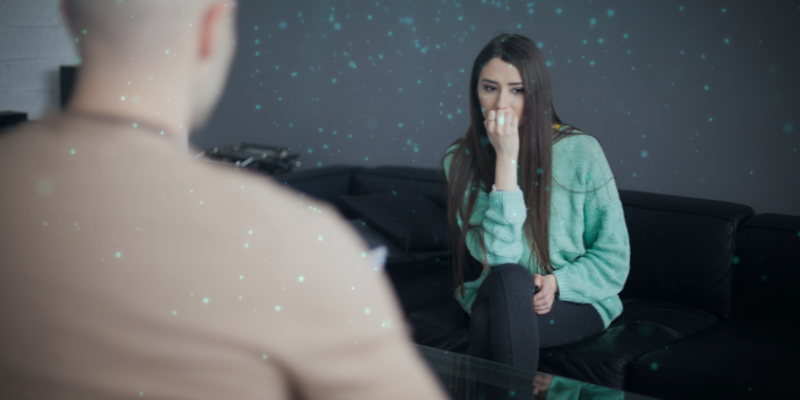
Can you guess what mental health condition is associated with confusion, forgetfulness, poor concentration, slowed speech, apathy, and decreased energy? If you answered dementia, you’d be correct. And if you answered depression, you’d also be right. Indeed, depression symptoms and dementia symptoms often overlap, which can lead to misdiagnoses and incorrect treatments.
Depressive symptoms later in life can look so much like dementia, the clinical term “pseudodementia” is used to describe it. Click To TweetThankfully, research involving brain SPECT imaging has shown some clear distinctions between the two conditions. We now have clearer signs to distinguish differences, help resolve confusion, and improve both diagnoses and effective treatments.
Here’s what you need to know to help recognize the indicators of dementia or depression in yourself or a loved one.
UNDERSTANDING DEPRESSION
Depression (also known as clinical depression or major depressive disorder) is a mood disorder characterized by persistent feelings of sadness, emptiness, and hopelessness. It can range in intensity from milder transient states of low mood to severe, persistent symptoms that permeate one’s thoughts, feelings, and actions.
Clinical depression may disrupt one’s ability to participate in daily life activities and progress into a variety of emotional and physical problems. It’s not a simple bout of the blues or something that one can snap out of, however, it is highly treatable.
Depression is not just one thing. The brain-imaging work at Amen Clinics shows that there are 7 types of depression. Major depressive disorder symptoms may include any of the following:
- Feeling of sad, empty, or hopeless
- Inability to find pleasure in hobbies, work or activities once enjoyed
- Sleep problems (too much or too little)
- Changes in appetite (too much or too little) with weight gain or loss
- Decreased energy, tiredness, or general fatigue
- Being highly agitated or feeling slowed down
- Feelings of worthlessness or guilt
- Trouble making decisions or making poor decisions
- Difficulty with concentration or focus
- Experiencing physical symptoms of pain such as headaches, body aches, or upset stomach
- Contemplating death or dying, suicidality
- Forgetfulness and confusion
- Slowed speech
WHO IS AT RISK FOR DEPRESSION?
Clinical depression affects approximately 17.3 million U.S. adults, more than 7% of the adult population. Twice as many women than men and almost three times as many teenage girls than boys are affected by depression.
While the CDC estimates depression rates to be as high as 13.5% in the elderly, it also notes that depression in older age is often undertreated and misdiagnosed. Indeed, a recent published report estimates the rate of elderly depression to be considerably higher at 30-45%.
Even though older age may bring chronic health issues, loss, and disappointment, depression is not a normal part of growing older. When it goes untreated, it can have a profound negative impact on one’s life including an increased risk of the following:
- Occupational problems
- Relationship problems
- Heart health problems
- Substance abuse (particularly opioids, marijuana, nicotine, and alcohol among the elderly, the NIH reports)
- Suicide
DEPRESSION AND DEMENTIA SIMILARITIES
One reason depression is often mistaken for dementia is that depression manifests differently as people grow older. Instead of sadness, they may feel generally “numb” or show a loss of interest in activities. They may be more reluctant to express or talk about feelings, and more likely to complain about physical ailments such as headaches or arthritis.
Depressive symptoms later in life can look so much like dementia, the clinical term “pseudodementia” is used to describe it. As mentioned, depression and cognitive impairment often occur together among the elderly population, making correct diagnosis difficult.
ABOUT DEMENTIA
Dementia is a blanket term used for a group of progressive neurodegenerative diseases that negatively impact significant brain functions and lead to memory problems, impaired cognition, trouble with language, and changes in behavior and personality.
When remembering things becomes increasingly more difficult and thinking skills are considerably less sharp, it might be a sign of developing dementia. Signs of dementia vary from person to person. They typically develop over time, at first appearing subtle and then becoming more noticeable. They may include any of the following:
- Forgetting where you’ve put something
- Trouble recalling people’s names or events
- Memory loss that is noticed by someone else
- Repeating questions
- Trouble making decisions or solving problems
- Changes in mood (may include anxiety, depression, or agitation)
- Trouble finding words or expressing one’s thoughts
- Losing track of time
- Difficulty with daily tasks or requiring help to do them
- Struggling with movement, coordination, or balance
- Difficulty with planning, organizing, or performing more challenging tasks
- Visual and spatial problems, such as getting lost when walking or driving
- Confusion and disorientation
- Changes in personality
- Exhibiting inappropriate behavior
- Seeing things that aren’t there (hallucinations)
- Being suspicious (paranoia)
WHO IS AT RISK FOR DEMENTIA?
Dementia can be both devasting and debilitating as it worsens. About 55 million people around the world live with some form of dementia, and it is the 7th leading cause of death in the U.S. and globally.
The most common form of dementia is Alzheimer’s disease, which accounts for 60-80% of memory loss cases. Vascular dementia, frontal-temporal lobe dementia, and alcohol-related dementia are among some of the lesser-known forms of dementia.
While more uncommon, some types of dementia, such as early-onset Alzheimer’s disease, affect younger populations as well. Dementia risk can be lessened with lifestyle changes. Once one is diagnosed with dementia, it can be managed but not cured. Untreated dementia worsens more rapidly.
HOW TO DIFFERENTIATE BETWEEN DEPRESSION AND DEMENTIA
Depression and dementia are highly entangled disorders. Nearly half of elderly individuals with depression also have cognitive impairment. Conversely, anywhere from 9-65% of people with dementia also have depression.
On a brighter note, research conducted by Dr. Daniel Amen and colleagues and published in the Journal of Alzheimer’s Disease has helped to differentiate the two disorders. The study, which used brain SPECT imaging on more than 4,500 patients (847 with some form of dementia, 3,269 with depression, 425 with both conditions) showed marked physiological differences between the groups.
Primarily, people with dementia showed overall lower blood flow to the brain (compared to depression), especially in the hippocampus temporal, and parietal lobes. In depressed patients, there was overactivity observed in the limbic system, which is the emotional center of the brain.
What’s more, the brain SPECT imaging could distinguish depression from cognitive disorders with 86% accuracy, and correctly diagnose them with 83% accuracy. In the cases of comorbidity (when both disorders were present), the accuracy rate was even higher.
Of course, not everyone can have a brain scan to correctly diagnose dementia or depression. Here’s what to look for in terms of symptomology to help differentiate the two.
SIGNS MORE LIKELY ASSOCIATED WITH DEMENTIA
- Memory loss comes on more slowly and gradually
- Increasingly misplace things
- Decreased judgment
- Personality changes
- Trouble performing familiar tasks
- Difficulty with words and language (using the wrong words)
- Disorientation regarding time and place
- Diminished abstract thinking
- Show little initiative, apathy
- Suicidal thoughts are rare
SIGNS MORE LIKELY ASSOCIATED WITH DEPRESSION
- Have had depression in the past or family history of depression
- Generally sad or negative
- Persistent worrying or frequently feeling anxious and panicky
- More prone to complain of physical symptoms (such as aches and pains)
- Feeling like life has no point and is not worth living
- Spells of crying with no understandable reason
- Trouble doing simple chores
- Decreased energy
- Feelings of loneliness or boredom
- Suicidal thoughts are common
Keep in mind that pseudodementia (depression masquerading as dementia) typically manifests with confusion, trouble with concentration, slower speech, forgetfulness, a decrease in energy, and apathy.
SEEK TREATMENT EARLY FOR DEPRESSION OR DEMENTIA
Memory loss and depression are not a normal part of aging. If you recognize signs of either in yourself or a loved one, seek the help of a qualified professional. Better outcomes are associated with accurate diagnosis and early treatment.
Depression, dementia, and other mental health issues can’t wait. At Amen Clinics, we’re here for you. We offer in-clinic brain scanning and appointments, as well as mental telehealth, clinical evaluations, and therapy for adults, teens, children, and couples. Find out more by speaking to a specialist today at 888-288-9834 or visit our contact page here.





very nice article!
Comment by Doug Morris — October 31, 2023 @ 2:40 PM
Thanks, that was really clear and helpful
Comment by Jenny — November 7, 2023 @ 11:37 PM
Agitation is most concerning to me..is this more depression or Alzheimer’s related in an 82,yr old male?
Comment by DonnacEvans — November 11, 2023 @ 5:34 AM
Very Helpful as I tend to wonder sometimes if I have both. Also both Depression & Alzheimer’s run in my family. Can they be hereditary?
Comment by Billie — November 20, 2023 @ 9:03 AM